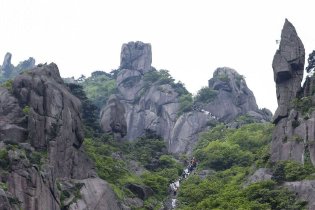Yabai, known as the "giant panda" of the plant kingdom, was once declared "wild extinct". In order to save this endangered species, Chongqing Xuebaoshan National Nature Reserve and a young scientific research team have been set up locally to protect Yabai and its biodiversity. After nearly 20 years of continuous efforts, the team has realized the rebirth of the endangered species Yabai. On the International Biodiversity Day on May 22, Xinhua Interview followed this team into the Daba Mountain Area, and together with Yang Quan, the head of the reserve, and his team members, they explored the unusual "counter attack" of Yabai.
Xinhua interview: How far is Yabo from people?
Yang Quan: Yabai is an ancient plant. Most places have been extinct due to the invasion of glaciers in the fourth season. Later, it only existed in the Daba Mountain area. In addition to the man-made destruction in modern times, it has become an endangered species. In 1999, after more than ten years of continuous field investigation, we found that there were only less than 10000 remaining Sabina vulgaris, and their living environment was very poor. They grew on cliffs, their age was relatively old, and the overall community structure was unbalanced.
At the beginning of the investigation and monitoring of Yabai, there were no drones or very advanced monitoring means, so we had to rely on manpower to search every corner and every cliff. In this process, we often encounter difficulties such as snake bites, falls, food starvation during camping in the wild, and bad weather changes.
Xinhua interview: How long has the team walked on the road of "Let Yabai return"?
Yang Quan: At present, the average age of 10 employees in our reserve is about 36 years old. When I first came here, I basically walked three steps and fell two times on the mountain road, but I gradually got used to it. Yabai is mainly distributed in the reserve, because there are many rare animals in our reserve, including Asian black bears, which are often encountered. We have files for every tree, and we monitor them every year. Every summer and autumn, we will do detailed plant monitoring. In these two seasons, we will spend at least two to three months in the wild, and one month in winter doing animal surveys in the wild. 365 days a year, we may spend more than 250 days in the mountains, living in the mountains, and eating in the mountains.
Interview with Xinhua: What is the biggest dream of animal and plant protection workers?
Yang Quan: Up to now, we have broken through the overall technical barrier of large-scale breeding of Yabai. The annual breeding amount can increase at a rate of one million. For example, by 2023, we will have bred nearly 2 million plants. This year, we can breed more than 3 million plants, so this is a virtuous circle.
In the cutting cultivation of Sabina amurensis seedlings, we will select the best trees from the good ones, and then pick its branches for cutting and cultivation. When we return to the wild manually, the sabina vulgaris seeds can germinate and reproduce naturally, which shows that sabina vulgaris can reproduce naturally with our help.
At present, we have set up 12 experimental bases in 12 locations of 9 provinces and cities in China in terms of adaptive cultivation test of Sabina vulgaris. In the future, we want to do more work in saving and protecting rare and endangered species, so that more rare and endangered species will become less rare, less endangered, closer to us and more closely related to mankind.
Since March 2023, Yabai has taken root in 8 test bases outside Chongqing, with a survival rate of 95% in Gaoligong Mountain of Yunnan, 85% in Daqing Mountain of Inner Mongolia, 75% in Changdao National Nature Reserve of Shandong, and 100% in Tianhua Mountain of Shaanxi. The wild return area of Sabina vulgaris in Xuebaoshan Nature Reserve exceeds 4500 mu, and the population has achieved sustainable growth, reversing the extremely endangered status of Sabina vulgaris.
Producer: Chu Xuejun
Planner: Che Yuming, Li Zhihui
Supervised by: Li Xiaoyun and Han Zhen
Executive Planner: Li You, Li Yuanyuan, Li Huazeng
Editor and director: Xu Ke, Chen Yu, Huang Junhui
Produced by: Huang Wei, Zhu Qing, Zhai Yiping
Designer: Ma Tianlong
Thanks: Chongqing Xuebao National Nature Reserve
Xinhua Interview Center Xinhua Chongqing Channel
Co production















